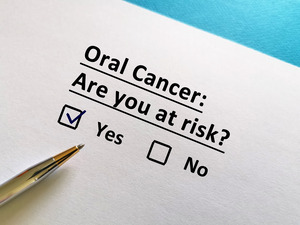
It’s estimated that one person dies of oral cancer every hour. Are you at risk for this life-threatening disease? Will you even be able to tell if you have it to begin with? What’s your best option for having it identified? If you don’t know the answers to these questions, then now’s the time to learn them; April is Oral Cancer Awareness Month, and your dentist has some important information to share with you.
The Risk Factors for Oral Cancer
Tobacco is one of the most notorious potential causes of oral cancer. It contains a number of carcinogenic chemicals that can alter the cells in your mouth. The longer you smoke or chew tobacco, the more likely it is that cancer will eventually develop.
Excessive drinking can also be a risk factor. Alcohol can affect the levels of certain hormones in your body, which can cause your cells to divide more frequently. Additionally, if you smoke, alcohol can make it easier for cancer-causing chemicals to enter the cells.
Lately, HPV (human papillomavirus) has been found to be a major risk of certain oral cancers, particularly those that occur near the back of the throat. It’s worth noting that oftentimes the body is able to fight off an HPV infection before it causes serious harm. Nevertheless, the link between HPV and oral cancer is not one that can be ignored.
The Symptoms of Oral Cancer
Several of the warning signs of oral cancer include:
- Sore or irritated spots.
- Discolored (red or white) patches.
- Mouth or lip pain.
- Lumps and rough areas.
- Changes to your bite.
- Hoarseness.
- A sensation of having something caught in your throat.
Seek help immediately if any of these symptoms last for two weeks or longer. Some of them might be the result of other oral health issues, so it’s necessary to have an expert look at your mouth to narrow down the underlying problem that needs to be addressed.
Having Oral Cancer Caught
Since you can’t assume that you’ll always notice the signs of oral cancer early on, you should have regular oral cancer screenings performed. This is something that your dentist can do during each checkup and cleaning. They’ll perform a quick search for oral cancer symptoms and inform you of any concerning findings. If they believe that you might have oral cancer, your next step will be to visit a specialist to have a biopsy performed.
Remember, even people without known risk factors can develop oral cancer. No matter who you are, having regular oral cancer screenings performed could be life-saving.
About the Author
Dr. Heliben Desai earned her Doctor of Dental Medicine from the Rutgers School of Dental Medicine in Jersey. She currently belongs to the Texas Dental Association and the American Dental Association. She can check for oral cancer and other issues in her patients’ mouths during routine checkups at Care 32 Dental of Grand Prairie. To schedule a consultation with Dr. Desai, visit her website or call (469) 837-8351.
